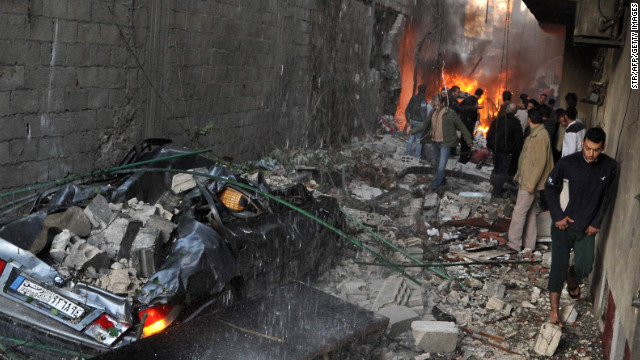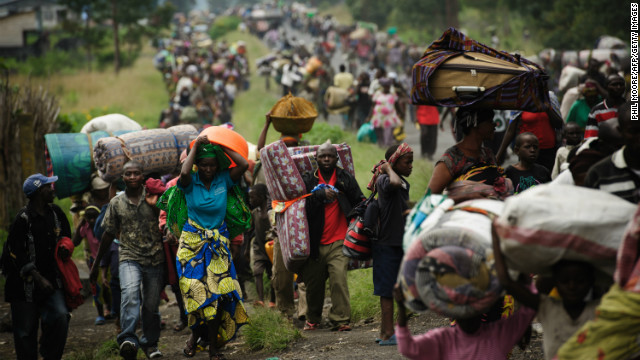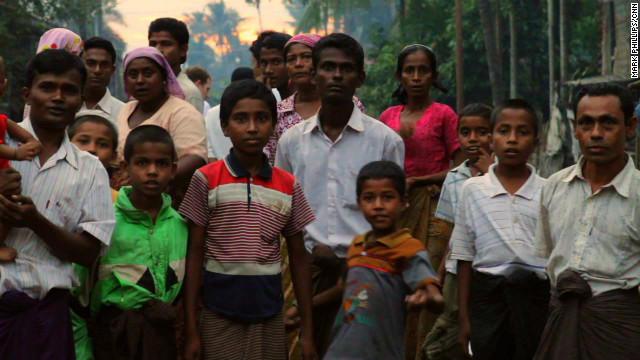ini dia ynag beda klik
Friday, November 30, 2012
Wednesday, November 28, 2012
Syrian rebels down jet, take video of bloodied pilot
(CNN) -- Syrian rebels appear to have scored a major victory Wednesday.
 Fighters who have been trying for nearly two years to topple President Bashar al-Assad and his sizeable military tell CNN that they have shot down three military aircraft in the
Fighters who have been trying for nearly two years to topple President Bashar al-Assad and his sizeable military tell CNN that they have shot down three military aircraft in the
 Fighters who have been trying for nearly two years to topple President Bashar al-Assad and his sizeable military tell CNN that they have shot down three military aircraft in the
Fighters who have been trying for nearly two years to topple President Bashar al-Assad and his sizeable military tell CNN that they have shot down three military aircraft in the
past 24 hours in the city of Aleppo.
Rebels posted two videos online to support their claims, including footage showing them bandaging a bloodied and moaning pilot.
CNN's Arwa Damon is inside Syria and went to the scene of one of the crashes.
She said locals rushed to the site and picked apart the aircraft, stuffing its parts in bags. Damon and her crew saw what appeared to be an engine on a cart hooked to a tractor. Cheering children were piled on the tractor as it drove away.
Other video shows rebels carrying an unconscious man wearing what looks like a military pilot uniform. Off-camera, someone says, "Here is the pilot who was shelling houses of civilians! The heroes of Darret Ezza shot down his plane!"
The video of the downed helicopters could be related to rebels seizing a key Syrian Air Force headquarters more than a week ago. The Assad regime has depended on the Air Force for much of the war to fight the rebels.
Video appears to show rebels coming upon a large cache of missiles at this particular headquarters, which CNN believes belongs to the Air Force 46th brigade. The rebels told Damon there were about 300 missiles in total, but only about half of them are operable. Many of them could be Soviet-era, and al-Assad kept the tube and trigger component of those weapons in separate locations to prevent their use should they wind up in the hands of his enemies. About half of the weapons, however, appear to work and the rebels told Damon they intend to use them.
Rebels also apparently posted a video of them demonstrating how to use the operable weapons.
Meanwhile, in another major incident in the country's capital Damascus, at least 45 people died and 120 were wounded in two car bombings in Jaramana, the Syrian Observatory for Human Rights said Wednesday. The Interior Ministry had conflicting numbers, reporting 34 dead and 83 injured.
Women and children were among those killed, the observatory said.
Jaramana, a small town surrounded by fields, has provided a refuge for pro-government Syrians displaced in the civil war.
the Local Coordination Committees of Syria reported a nationwide death toll of 90 for Wednesday, including the people it said were killed in Jaramana.
State media did not give a nationwide toll.
At the same time the car bombs went off, two explosive devices simultaneously detonated in the al-Nahda and al-Qerayyat neighborhoods, both of which are in the Damascus suburbs. Officials did not provide a casualty count in those areas.
Jaramana residents are a mix of Christians and the Druze, the latter a minority offshoot of Shiite Islam.
Government officials blamed the attacks on terrorists, a term Syria routinely uses for rebel fighters and extremist elements in the country.
How did the Syrian crisis begin?
What started as security forces cracking down on mostly nonviolent protesters has spiraled into a civil war between pro-government forces and the rebels, including the Free Syrian Army.
About 40,000 civilians have been killed since the first protests 20 months ago against President Bashar al-Assad's government, according to the opposition Center for Documentation of Violations in Syria. And more than 380,000 Syrian refugees have fled to neighboring countries, creating humanitarian challenges abroad.
CNN cannot confirm claims by the government or the opposition because of government restrictions that prevent journalists from reporting freely within Syria.
Turkey's role
Turkey asked NATO Wednesday for Patriot missiles to bolster its air defenses against its southern neighbor, with which it shares a 822-kilometer (about 511-mile) border.
A letter to NATO included the "formal request" that the alliance send "air defense elements," according to a Turkish government statement that cited "the threats and risks posed by the continuing crisis in Syria to our national security."
The statement added that the NATO Council would convene "shortly" to consider the matter.
NATO Secretary-General Anders Fogh Rasmussen said in a Twitter post that the request would be considered without delay. A fact-finding team is on the ground in Turkey, according to Lt. Col. Jay Janzen, a spokesman for Supreme Headquarters Allied Powers Europe.
"The fact-finding teams include experts from the nations that have shown their willingness to offer Patriots as well as Turkish officials and a few NATO experts," he said.
Turkish officials have emphasized that any deployment of the Patriot missiles would be purely for defensive measures. President Abdullah Gul said earlier this month that Turkey has no intention of going to war with Syria.
A NATO official who is not authorized to speak on record to the media told CNN that fact-finding team now in Turkey includes military personnel from Germany, the United States and Holland, the three countries that have available Patriot missile batteries.
The official also indicated that those batteries could be deployed dozens of kilometers away from the border fence.
"No decisions have been made about the location and numbers of Patriot batteries in Turkey," the official said.
The official said he doesn't believe "there will be an imminent threat from this deployment escalating the conflict between Turkey and Syria."
"By contrast, I think it will demonstrate a deterrence effect," the official said, "and make it clear that NATO is prepared to defend Turkish territory and Turkish population."
Why the world is ignoring Congo war
5:06 AM
No comments
 Editor's note: Vava Tampa, a native of Congo, is the founder ofSave the Congo, a London-based campaign to tackle "the impunity, insecurity, institutional failure and the international trade of minerals funding the wars in Democratic Republic of the Congo." Follow Vava Tampa on twitter: @VavaTampa
Editor's note: Vava Tampa, a native of Congo, is the founder ofSave the Congo, a London-based campaign to tackle "the impunity, insecurity, institutional failure and the international trade of minerals funding the wars in Democratic Republic of the Congo." Follow Vava Tampa on twitter: @VavaTampa
(CNN) -- If humanitarian crises were listed by some sort of moral -- or editorial -- standards on the stock exchange, to help indicate which ones urgently require international news coverage and political action, shares of the situation in the Democratic Republic of the Congo (DRC) would have commanded international news headlines and extensive press coverage over the past 12 years.
The U.N. has labeled the DRC, Africa's second largest country, as the "rape capital of the world" because of the pace and scope of the use of rape as a weapon of war by proxy militia gangs fighting for control of Congo's easily appropriable and highly valuable natural resources, destined for sale in Europe, Asia, Canada and the United States.
The wars in that country have claimed nearly the same number of lives as having a 9/11 every single day for 360 days, the genocide that struck Rwanda in 1994, the ethnic cleansing that overwhelmed Bosnia in the mid-1990s, the genocide that took place in Darfur, the number of people killed in the great tsunami that struck Asia in 2004, and the number of people who died in Hiroshima and Nagasaki -- all combined and then doubled.
Yet we rarely hear anything about it. Indeed, one only need contrast media coverage of the latest Israeli airstrikes on the Gaza strip and Hamas rocket attacks into southern Israel, which have made front pages around the world, to the stunningly limited media coverage afforded to graphic accounts of atrocities committed that same week by M23, the newest militia gang terrorizing the local population.
The same trend has been observed in the extensive coverage of the on-going, fast-moving and difficult-to-report civil war in Syria, which has claimed nearly 40,000 lives.
M23's murderous campaigns to besiege Congo's eastern mineral-rich provinces of North and South Kivu have left over 200,000 people in terrible conditions, killed countless and ushered in a dire humanitarian transgression.
The Rwandan government has been accused by the United Nations of backing M23 by providing it with arms, support and soldiers, but Rwanda's President, Paul Kagame, has denied the allegation.
The question here is not whether the human suffering in Congo deserves more media coverage because it is greater than that in Syria or Gaza, but rather, why has the crisis in Syria or Gaza qualified for extensive media coverage, but not the killing and raping industries in Congo?
I doubt that this is because of a shortage of sobering imagery of Congo's killing fields or a lack of first-hand testimonies from survivors, or a lack of human rights and humanitarian reports and assessments of the situation.
Is it due to the geographical or cultural distance between London or Washington and Congo? Or are Western media just reluctant, if not uninterested, to cover it because no Western interests or ally is endangered by it?
Would the coverage the situation in Congo receives be the same if it was happening in Europe or if Congo spoke English rather than French?
What if Robert Mugabe of Zimbabwe or his disciples were implicated in funding murderous militia gangs in Congo? Or if the killing was between black Africans and Arabs? Or if minerals funding Congo's killing and raping industries benefited the East more than the West?
But as an activist, I believe that the editors of news organizations such as CNN, Al Jazeera and the BBC must flood the airwaves with vivid images and news stories on the human sufferings in Congo. Newspapers such the Guardian, in the UK, and the New York Times must drumbeat front-page news stories on the wars and human tragedy engulfing that country.
Unless they tip that balance a little and force policy makers in Washington and internationally to pay more attention and act, the killing, raping and looting that have thus far claimed over 5.4 million Congolese lives, and continue to leave 1,100 women raped every single day, could continue to unfold undetected by the camera lenses of Western media and excluded from Western political agenda.
The opinions expresse
Terrorized, starving and homeless: Myanmar's Rohingya still forgotten
5:02 AM
No comments
 Sittwe, Myanmar (CNN) -- It's been three years since I reported on the plight of the Rohingya Muslim people of western Myanmar and neighboring Bangladesh.
Sittwe, Myanmar (CNN) -- It's been three years since I reported on the plight of the Rohingya Muslim people of western Myanmar and neighboring Bangladesh.
We called our documentary "A Forgotten People," and it looked at appalling incidents where boatloads of refugees fleeing poverty and persecution arrived in Thailand only to be towed back out to sea and abandoned by the Thai security forces. Hundreds died or went missing.
But now that's changing. U.S. President Barack Obama addressed their plight during his recent visit to Yangon. The lukewarm response he got in the auditorium was nothing to the vitriol he got online. Even mentioning the name Rohingya is controversial for some in Myanmar
We have come to Rahkine to report on the latest threat to the Rohingya. What we have found is shocking. The Rohingyas are among the most persecuted people on the planet. In both Myanmar and Bangladesh -- where they have a deep-rooted heritage dating back to when it was known as East Bengal -- they are not officially citizens and are denied passports, access to health-care, education and decent jobs.
Each country claims the Rohingya is the other's problem. In July this year, the Bangladeshi government ordered three international aid organizations to stop helping Rohingya who were crossing the border from Myanmar.
In Myanmar, their perilous situation has become markedly worse in recent months. Mobs of Buddhist Rahkine extremists have been torching whole Rohingya villages.Hundreds have died and more than 100,000 people have been forced to flee, according to humanitarian groups.
But there is nowhere for them to go. So driven by fear many are congregating in huge makeshift camps on the edge of the Rahkine town of Sittwe.
I was expecting the camps to be grim -- but I wasn't prepared to see children starving to death. This isn't journalistic hyperbole. The two western doctors working unofficially here have watched several children perish before their eyes -- not from a rare tropical disease or an untreated chronic condition, but simply from malnutrition.
I find it sickening and outrageous that this is happening in a land of plentiful food in 2012. Perhaps I am naïve or too idealistic. I should probably know better, I should have seen enough of the world's misery and violence to be unaffected by a wide-eyed kid too fatigued to swat the flies from her eyes. But this one broke my heart.
She's not alone.
Saturday, November 24, 2012
JawabanUlangan KK
2:27 AM
No comments
jwaban kk1
1.multimedia secara bahasa yautu : multi artinya banyak , media artinyya alat,jadi maksudnya banyak alatyang bisa di gunakan untuk membuat suatu hal seperti editing vidio dll.
2.-pembuatan ktp ellektronik
-layanan telepon desa
-layanan internet masyarakat
-print gratis untuk masyarakat
-layanan internet untuk masyarakat
3.-vidio cara kerja alat ukur
-vidio eksperimen - eksperimen
-vidio animasi tentang materi fisika
-vidio tentang gayaan
5.judu :"BERBURU TOMCAT"
-di sutradarai oleh :pyters michael
-jenis film :komedi
-di produseri oleh :sony entertaiment
-durasi :02:00 (2 jam)
-sinopsis :ada sekumpulan murid smp yang resah karna di kampungnya banyak tomcat berkeliaran ,awalnya mereka mengira itu awalnya hanya serangga biasa namun setelah ada korban yang kena merekapun membentuk sebuah tim namanya tim bacet yang artinya "BASMI TOMCAT" dan mereka selalu beraksisetiap tomcat datang ,mereka menggunakan baju dari kardus dan sapu sebagai senjatanya untuk melawan tomcat tersebut. dakhirnya kampung itu bebas tomcat dan akhirnya mereka jadi phlaean di kampungnya.
-biaya produksi :sekitar 1,3 M dan memperoleh keuntungan skitar 3M
-pemeran/tim bacet: IJEM sbagai ANGEL
USMAN sbagai JAK (pemimpin)
UDIN sbgai ERIK
ICIH sbagai CATY
DIDIN sbagai GABRIEL
-tempat shooting :-dikampung rambutan
-kota tua
- sungai ciliwung
-senaian
1.multimedia secara bahasa yautu : multi artinya banyak , media artinyya alat,jadi maksudnya banyak alatyang bisa di gunakan untuk membuat suatu hal seperti editing vidio dll.
2.-pembuatan ktp ellektronik
-layanan telepon desa
-layanan internet masyarakat
-print gratis untuk masyarakat
-layanan internet untuk masyarakat
3.-vidio cara kerja alat ukur
-vidio eksperimen - eksperimen
-vidio animasi tentang materi fisika
-vidio tentang gayaan
5.judu :"BERBURU TOMCAT"
-di sutradarai oleh :pyters michael
-jenis film :komedi
-di produseri oleh :sony entertaiment
-durasi :02:00 (2 jam)
-sinopsis :ada sekumpulan murid smp yang resah karna di kampungnya banyak tomcat berkeliaran ,awalnya mereka mengira itu awalnya hanya serangga biasa namun setelah ada korban yang kena merekapun membentuk sebuah tim namanya tim bacet yang artinya "BASMI TOMCAT" dan mereka selalu beraksisetiap tomcat datang ,mereka menggunakan baju dari kardus dan sapu sebagai senjatanya untuk melawan tomcat tersebut. dakhirnya kampung itu bebas tomcat dan akhirnya mereka jadi phlaean di kampungnya.
-biaya produksi :sekitar 1,3 M dan memperoleh keuntungan skitar 3M
-pemeran/tim bacet: IJEM sbagai ANGEL
USMAN sbagai JAK (pemimpin)
UDIN sbgai ERIK
ICIH sbagai CATY
DIDIN sbagai GABRIEL
-tempat shooting :-dikampung rambutan
-kota tua
- sungai ciliwung
-senaian
Tuesday, November 20, 2012
Israel, face new reality: Talk to Hamas
11:59 PM
No comments
(CNN) -- When I visit Jerusalem and the West Bank, I
frequently ask young Arabs about their views on Hamas. In almost every
discussion, Christians and Muslims alike refuse to label Hamas as a
"terrorist" organization. When I raise criticism of Hamas and its
targeting of innocent civilians, my comments never register. The
responses are some variation of "Israel has taken over our lands and
killed thousands of Arab civilians over the years. Hamas is only
resisting occupation and fighting for our rights."
I hear similar sentiments
in Egypt, Saudi Arabia and even non-Arab Pakistan. Al-Jazeera Arabic
gives prominence to the popular Egyptian Muslim Brotherhood cleric Yusuf
al-Qaradawi, who has repeatedly called suicide bombings against
Israelis not terrorism, but "martyrdom." He argues that since Israelis
all serve in the military, they are not civilians. Even children, he
despicably argues, are not innocent. They would grow up to serve in the
military. Qaradawi is not alone.
I can name tens of Muslim
clerics, important formulators of public opinion in a region dominated
by religion, that will readily condemn acts of terrorism against the
West, but will fall silent when it comes to condemning Hamas or Islamic
Jihad. Put simply, support for violent resistance against Israel among
Arab and Muslim-majority countries -- including allies of the United
States such as Qatar, Saudi Arabia, Egypt, Turkey, Tunisia  -- remains
popular.
-- remains
popular.
 -- remains
popular.
-- remains
popular.
Hamas benefits from that
support. From radical Iran to moderate Tunisia, Hamas' Prime Minister
Ismail Haniyyeh was welcomed by vast cheering crowds during visits this
year.
In a new Middle East,
where popular opinion matters more than ever before, to demand that
people condemn Hamas is a political nonstarter. It won't happen.
Israel's talk of Hamas terrorism has failed to convince the Muslim and
Arab masses. And worse, the label of "terror" loses its importance when
entire populations, essentially, see nothing wrong with Hamas's violent
activities.
In short, Israel's
strategy has failed to win Muslim hearts and minds. In the long term, it
cannot continue to rely on military superiority and Western support in
the face of popular hostility. Israel is a nation in the Middle East,
and it needs to find a home and place among its increasingly democratic
neighbors. The old ideas of "we do not talk to terrorists" are not only
strategically futile, but also untrue.
In order to secure the
release of kidnapped Israeli soldier Gilad Shalit, Israelis (in both
official and unofficial capacities) negotiated with Hamas. In spite of
the Netanyahu government's bluster about refusing to deal with Hamas
now, securing a cease-fire involves doing exactly that with the help of
Egypt's new Islamist government.
In the past, Israel
refused to talk with the PLO and Yasser Arafat, and in 1988, despite
Israel's intransigence, the United States opened a dialogue with the PLO
and thereby helped steer the organization to its nonviolent politics
today. Similar examples abound in recent history from South Africa,
where Margaret Thatcher once called the African National Congress and
Nelson Mandela terrorists, to Northern Ireland's Sinn Fein.
In short, when the
political calculations shift, the actions of terrorists are altered.
Lest we forget, George Washington was labeled a terrorist by the
British. But that label carried little weight amid his support base in
America.
Today, Israel's labels
of terrorist mean nothing to the people of the region. Newly empowered,
their views and attitudes matter. Israel cannot continue to swim against
the tide. For its own security, to strengthen the interests of the
United States in the region and to show recognition of the changes that
are sweeping the entire Middle East, Israel needs to change. It must
talk directly with Hamas. The old game is over. Hamas is here to stay.
In 2004 Israel killed its founder Ahmed Yassin, and then his successor Abdel Aziz Rantisi Rantissi and now the head of its military wing, Ahmed al-Ja'abar, each time vowing to weaken Hamas, only to see it return stronger. Those mistakes cannot be repeated again.
To demand that Hamas
abandon violence, change its charter or recognize Israel is not the
beginning, but should be the end results of a peace process that builds
trust over a period of time. To impose these as preconditions and
thereby exclude Hamas, while also neglecting the Fatah government in the
West Bank, is to give a clear message to Arabs that no strategy (that
of Fatah or Hamas) is to Israel's liking. Such perceived arrogance
further alienates populations in important countries such as Turkey and
Egypt, not to mention the Palestinians.
The United States needs
these newly emerging democracies on its side. Better relations with 300
million Arabs helps secure Israel too. A stronger America in the region
is good news for Israel. A tiny nation of seven million cannot be
allowed to damage ties between 360 million Americans and 300 million
Arabs. Conversely, Arabs have a duty to recognize Israel as home to the
children of Abraham, the descendants of Moses.
Across the Arab world,
from Tunisia to Yemen, we are witnessing turmoil and the rise of violent
Salafi organizations. Attacks on U.S. embassies recently served as a
potent reminder of the forces that are being unleashed. Israel can help
itself, its neighbors and the United States by at least ending its old
tactics of war and embracing the Arab peace plan offered since 2002 by
Saudi Arabia and endorsed by the Arab League. It is time for Israel to
act like the democracy it claims to be and end the siege of Gaza and the
occupation of the West Bank.
Follow us on Twitter @CNNOpinion.
Thursday, November 15, 2012
Shadow of former president looms over China's new leaders
10:07 PM
No comments
Hong Kong (CNN) -- When the new names of China's
elite political committee were announced Thursday they didn't come as a
surprise to one leading China expert. Rather, they reinforced the sense
of "a major opportunity lost."
"This Party congress has sent a very clear signal that this leadership is politically conservative," said Cheng Li of the Brookings Institution,
who predicted that the lineup wouldn't go down well with the Chinese
people who he said were looking for signs of political reform.
"You can imagine the
Chinese public may start to express some dissatisfaction with the
dominance of princelings (sons of revolutionary leaders), with the elder
and retired top leader Jiang Zemin's interference in the process of
succession, and also that two liberal leaders Li Yuanchao and Wang Yang
are excluded in the new Politburo Standing Committee (PSC)," he said.
As expected, the number
of seats on the PSC shrank from nine members to seven and included the
names at the top of many speculative lists: Xi Jinping (President), Li Keqiang (Premier), Zhang Dejiang, Yu Zhengshen, Liu Yunshan, Wang Qishan and Zhang Gaoli.
Subscribe to:
Comments (Atom)















